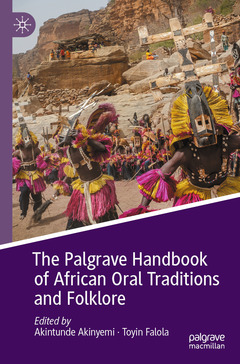Description
The Palgrave Handbook of African Oral Traditions and Folklore, 1st ed. 2021
Coordinators: Akinyemi Akintunde, Falola Toyin
Language: English
Publication date: 03-2022
1026 p. · 15.5x23.5 cm · Paperback
Publication date: 03-2021
1026 p. · 15.5x23.5 cm · Hardback
Description
/li>Biography
/li>Comment
/li>
Editors:
Akintunde Akinyemi is Professor and Chair in the Department of Languages, Literatures, and Cultures at the University of Florida, USA.
Toyin Falola is the Jacob and Frances Sanger Mossiker Chair in the Humanities and a Distinguished Teaching Professor at the University of Texas at Austin, USA.
Partial Listing of Contributors:
Julius Adekunle, Monmouth UniversitySimeon Ibigbolade Aderibigbe, University of Georgia at Athens, USA
Chiji Akoma, Villanova University, USA
Adetayo Alabi, University of Mississippi, USA
Joyce Ashuntantang, University of Hartford, USA
Karin Barber, University of Birmingham, UK
Ragi Bashonga, Human Sciences Research Council, South Africa
Robert Cancel, University of California, San Diego, USA
Raphael d’Abdon, University of South AfricaErnest N. Emenyonu, University of Michigan–Flint, USA
Olawole Famule, University of Wisconsin at Superior, USA
Artisia Green, College of William and Mary, USA
Marame Gueye, East Carolina University, USA
Lee Haring, Brooklyn College, CUNY, USA
Kathryn Jones, Swansea University, UK
Kasongo M. Kapanga, University of Richmond, USA
Russell H. Kaschula, Rhodes University, South AfricaCécile Leguy, Université Sorbonne Nouvelle – Paris 3, France
Joseph McLaren, Hofstra University, USA
Patricia Beatrice Mireku-Gyimah, University of Mines and Technology, Ghana
Mustafa Kemal Mirzeler, Western Michigan University, USA
Besi Brillian Muhonja, James Madison University, USAJuliana Makuchi Nfah-Abbenyi, North Carolina State University, USA
Jacomien van Niekerk, University of Pretoria, South Africa
Felicia Ohwovoriole, University of Lagos, Nigeria
Rose Opondo, Moi University, Kenya
Félix Ayoh'Omidire, Obafemi Awolowo University, Nigeria
Gail Presbey, University of Detro
Offers a complete, deep, and innovative analysis of oral traditions and folklore in Africa and among Africans in the diaspora
Asses the current and historical dynamics between oral traditions and folklore, illustrating how the nature of oral transmission of cultural heritage and folklore is simultaneously vital to the livelihood of tradition while also at the heart of the issues that surround their diminished role in an increasingly globalized society
Creates a comprehensive, multidisciplinary, and well-researched collection of essays covering different aspects of African oral traditions and folklore
Provides fresh insights into new discourses and intellectual development in African oral traditions and folklore occasioned by new directions in development studies, globalization and some other critical issues raised by the diaspora
Centers theoretical debates on such topics as the collective or communal character of oral cultures, the relationship between tradition and individual talent, and the unique circumstances required for traditions to emerge
Establishes a reference for comparative analysis and ongoing debates in Africanist discourse on gender, class, ethnicity, language, and cultural nationalism




